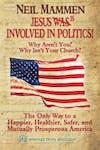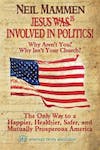
A notable book recently hit the shelves of both religious and political literature forums: ‘Jesus is Involved in Politics! Why aren’t You? Why isn’t Your Church?’ A compelling read, the book serves as a clarion call for church leaders and believers. It dives deep into an often-contested subject — the involvement of churches in politics. The crux of the book spurs readers to look beyond the act of voting and take on an active role in shaping both religious and secular policies.
Contrary to the common belief, the narrative of Christians impacting socio-political changes is deeply rooted in history. This fascinating book affirms that countless objectionable practices, such as slavery and child prostitution, were abolished due to the political involvement of Christians. Illustrating this point is the account of Pastor John Newton, who, with his church, played a crucial role in the abolition of slavery. The unveiling of such historical accounts throughout the book undeniably shatters many popular misconceptions.
The reader’s journey through the book is not just a historical voyage. It also explores Jesus’s direct involvement in politics. Supporting the thesis with Biblical evidence, the author provides a fresh perspective on Jesus’s interaction with politicians of His time. This perspective challenges readers to rethink the so-called boundary separating church and state.
When the book takes a daunting turn from historical accounts to contemporary issues, the author emphasizes an assertive approach to religious leaders and believers. Here, we are reminded that politics is not just about power or corruption; it’s about upholding justice, equity, and welfare. Thus, the idea of avoiding politics for fear of sparking controversy within the congregation is debunked.
The latter part of the book links the church’s avoidance of politics to our societal challenges today: poverty, crime, broken families, and in worst scenarios, a resurgence of past atrocities like racism and child labor. The author boldly states that the remediation of these issues lies in the church’s hands. However, this vision will materialize if, and only if, pastoral instruction includes the principles of law and social justice. This call to action poses a stark contrast to taking a back seat and allowing the decay of moral values and society as a whole.
‘Jesus is Involved in Politics! Why aren’t You? Why isn’t Your Church?’ serves as a revelation to Christians. Not only does it challenge common misconceptions, but it also presents the urgent need for Christians to step up and actively influence the political landscape whose outcomes inevitably intersect with religious freedom and societal welfare.
In conclusion, this book is a must-read for anyone who seeks to align their Christian faith with their civic responsibilities and appreciate how the church can shine its light even in the darkest corners of politics.

